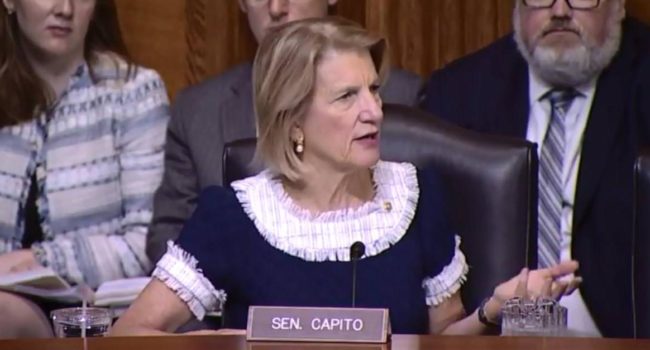The federal fiscal year starts Oct. 1 and appropriations bills are making their way through Congress.
Sen. Shelley Moore Capito, R-W.Va., sits on the Senate Appropriations Committee and highlighted on Thursday some measures she’s included to benefit her constituents.

Of local interest is $800 million for Fossil Energy Research, included in the Fiscal Year 2020 Energy and Water Development Appropriations Act. That figure, she said, is $60 million above the FY 2019 enacted level and $238 million above the budget request.
It covers research for technologies to advance coal, natural gas, oil, and other fossil energy resources and includes the budget for the National Energy Technology Laboratories, with sites in Morgantown, Pittsburgh and Albany, Ore.

Capito spokeswoman Kelley Moore pointed out that this funding has steadily increased during Trump administration (as a result of ongoing efforts by the whole West Virginia delegation). This year’s appropriation – FY 19 – is $740 million. Previous years were: FY 18, $726 million; FY 17, $668 million; FY16, $632 million.
This bill was marked up in committee on Thursday and passed unanimously. It heads to the full Senate. It also approved, in a 16-15 vote, the marked-up Department of Defense Appropriations Act
“As we begin the markup process in the Appropriations Committee, I was proud that so many of the items I advocated for were included in the government funding legislation that will advance to the Senate floor,” Capito said. “With these bills, we fund our national defense and will develop and study coal as a natural resource, among other things.”
The House has already passed its appropriations bills and its Energy and Water bill is has been read twice in the Senate. Rep. David McKinley, R-W.Va., and other members of the bipartisan Coal Caucus had sought $858 million for Fossil energy Research, but the House approved $738,600,000.
McKinley was a leader in the long effort to preserve and increase NETL funding and said in an email, “The world will continue to be reliant on fossil energy for years to come. Therefore, we must find ways to use it in the cleanest and most efficient way. That is why my office has pushed for funding for fossil fuel research and development. Our office successfully led the fight to protect and enhance funding for National Energy Technology Laboratory in Morgantown, and support their mission to develop cutting edge research.”
Capito also pointed out some other items she was able to include in the Energy and Water bill: $175 million for the Appalachian Regional Commission, an increase of $10 million over FY 19; language supporting continued efforts for the Appalachian Storage Hub, including funding for the Title XVII Loan Program; and funding for operations and maintenance of West Virginia’s Corps of Engineers sites—such as Bluestone Dam, the Robert C. Byrd Locks and Dams, and Summersville and Sutton Lakes.
The Department of Defense bill includes money for the Mountaineer ChalleNGe Academy in Preston County.
Moore explained a little of what’s ahead for the appropriations bills.
There are 12 altogether, she said. Compromise, mutually agreeable versions of them are supposed to be passed and signed in time for the start of the new fiscal year. Senate Majority Leader Mitch McConnell had hoped to have a “minbus” bill passed as soon as next week, but it will be procedurally difficult to get all 12 passed by the deadline.
So McConnell has said a continuing resolution – a temporary funding measure – may be necessary to bridge the gap, Moore said.
Sen. Joe Manchin, D-W.Va., is also on Appropriations and his office had hoped to answer questions about the measures, but was unable to respond in time for this report.
Tweet David Beard @dbeardtdp Email dbeard@dominionpost.com



